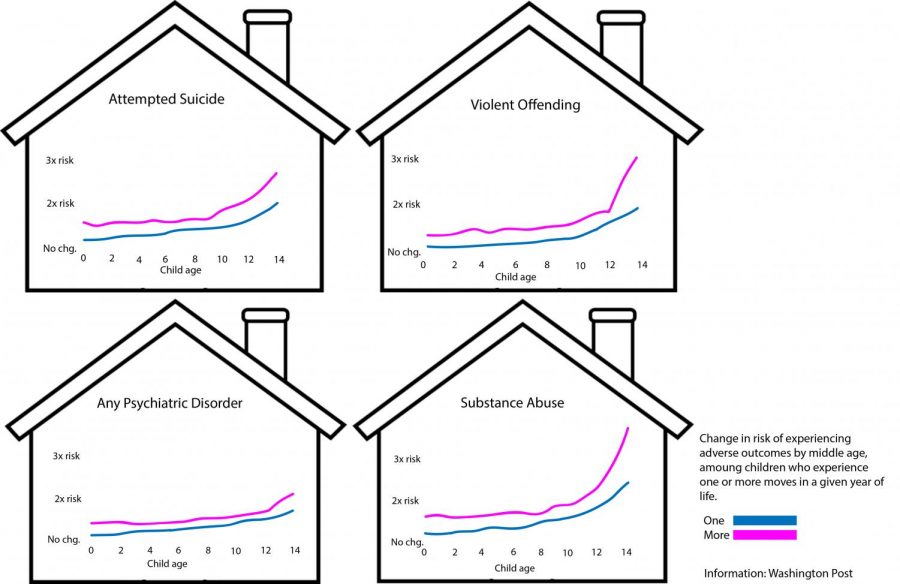Moving as a child has impacts in later life

More stories from Hazel McKinney
Moving as a child increases chances of many dangers you can face in life. Above are just some of the outcomes.
Moving homes can be mentally challenging, especially at a young age. Imagine having to leave everything you’ve ever known and go live in a new place. Many youth have trouble settling in at first and suffer from a decision that they often have had no part in. “No, I did not have a say in my move. I did however get to vote on a house but that’s really it,” said freshman Charlie Denny.
According to a study by The American Journal of Preventive Medicine, people who move at a younger age were more likely to have negative outcomes later in life, including drug usage, violence, and attempted suicide.
Some reasons people move are: the separation of parents, new job opportunities, and for safety. “We moved mostly because my mom and dad got divorced when I was little,” said Denny.
“A lot of it also depends on why families are moving whether it’s a divorce, just selecting a new home, homelessness, a lot of it really depends on what it is a [family is trying to] figure out. What people can put in place to make those transitions smoother.”
It definitely is hard to move once you plant roots in a new place. “If my mom made me move now to a different state I would not go,” said Denny. Leaving your old home behind is enough change by itself but it can get even more overwhelming when you are the new kid at a school.
“If you’re in a stable home, things are easier, and… it’s predictable. People know what to expect, they know the neighborhood, they know the people around them, they know the routes to and from school,” said South social worker Sheri Harris.
At first, moving to a new place can be scary and it can be hard to adapt to a new way of life. “It took about six months, to get used to my new school and to get used to everybody,” said freshman Sam Reffuge. Learning how to make new friends is a skill many people find useful from the moving process. “I think [moving] helps them because they have better social skills but it can be hard for them to not see their family or whoever was back home,” said Reffuge. But leaving friends behind can be tough.
“Moving, I did have to lose a couple friendships, like a lot actually,” said Denny. “I don’t get to see my dad’s family a lot and I don’t get to see where I was born and where I’m from a lot,” Reffuge said.
But you can meet new friends: “I got to meet a lot of new amazing people in my life and I got to get some real opportunities,” said Reffuge. Moving can give all kinds of new experiences, “I learned how to make friends fast because that’s kind of how you survive in school,” Reffuge said. “I have moved six times. The more times you move it does get a lot easier because sometimes when you move you’ll have packed stuff and you won’t ever unpack it and then you just move it to the next house ‘cause you never unpacked it,” said Denny.
“If families are moving around a lot, it’s hard because then there’s no stable place that feels like home and so I think that it can have a huge impact on students,” said Harris. “I would suggest… one of the ways to combat the stress is to figure out where to make things predictable, so for example making sure that they still come to school every day,” she added.
For some people just the experience of having to move can cause long term effects, especially if they are between the ages 10 and 16. These seem to be the years where change is harder mentally. Middle and high school can be challenging enough as they are, so having to relocate to a new place can make these years even harder. “It’s harder to pay attention and to really think about school when what you’re really thinking about is wait… where’s home again? And where should I be going, and what’s going on,” said Harris.

Debuting with her first year, The Southerner welcomes Hazel Mckinney to its staff! Being a freshman with a fresh face she felt as though that it'd be fun...

Katherine Lundquist is the Editor in Chief of our student run newspaper, and has been on the team since freshman year. Lundquist is invested in nature,...

